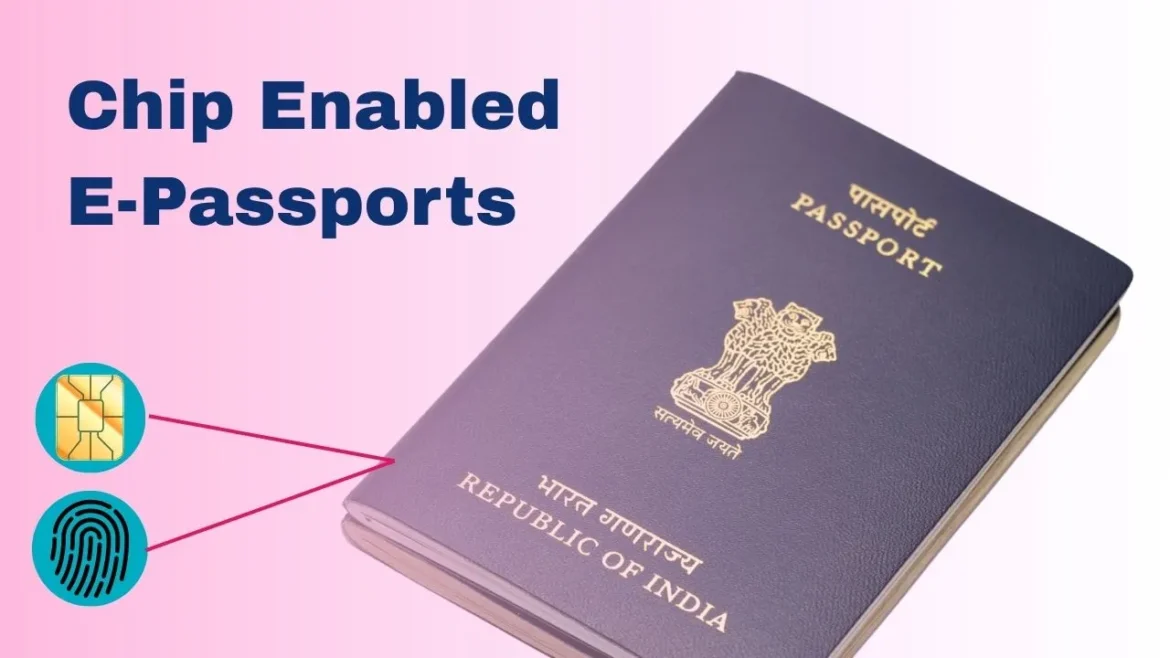Here are 10 key points India Launches Chip Enabled E-Passports in Key Cities:
- India Joins Global E-Passport Network: India now stands alongside 120+ countries like the USA, Japan, and France in using chip-based biometric passports, enhancing global travel security.
- Pilot Rollout in April 2024: E-passports were first introduced in cities like Nagpur, Chennai, Jaipur, and Hyderabad as part of the Passport Seva 2.0 upgrade.
- Nationwide Rollout by Mid-2025:The government plans to expand e-passport issuance across all regions of India by mid-2025.
- Chip Embedded in Passport Cover: Each e-passport includes an RFID chip that securely stores the holder’s personal and biometric data.
- Faster Immigration with E-Gates: E-passports enable contactless verification at airports, reducing wait times and speeding up the immigration process.
- ICAO-Compliant Security Standards: E-passports follow global ICAO guidelines, making them secure, tamper-resistant, and internationally accepted.
- Application via Passport Seva Portal: Citizens can apply online, pay fees, and schedule appointments for biometric data collection at Passport Seva Kendras.
- Produced at India Security Press: All e-passports are made in Nashik, supporting the Make in India initiative and ensuring data safety.
- Tamper-Proof and Fraud Resistant: Biometric features make e-passports hard to forge, reducing risks of identity theft and misuse.
- Step Toward Digital Travel Future: E-passports pave the way for paperless travel with upcoming features like digital visas and mobile passport wallets.
India has begun issuing biometric, chip-enabled e-passports in selected cities under the revamped Passport Seva Programme 2.0. The initiative aims to enhance passport security, simplify immigration processes, and offer Indian citizens a more modern and secure travel experience. A full nationwide rollout is expected by mid-2025.
Joining the Global League
India has officially entered the list of more than 120 countries including the United States, Canada, France, Japan, and Australia that use chip enabled passports. These e-passports are designed to enhance the safety of international travel, reduce the risk of identity fraud, and enable contactless immigration. By adopting this system, India strengthens its global credibility and ensures Indian travellers are on par with those from technologically advanced nations.
When Did the Rollout Start?
The rollout began in April 2024 with a pilot phase in cities like Nagpur, Bhubaneswar, Jammu, Panaji, Shimla, Raipur, Amritsar, Jaipur, Chennai, Hyderabad, Surat, and Ranchi. In Tamil Nadu, the Regional Passport Office in Chennai started issuing e-passports on March 3, 2025. According to the Ministry of External Affairs, by March 22, more than 20,700 e-passports had already been issued in the state.
What Exactly Is an E-Passport?
An e-passport looks similar to a regular passport but includes advanced technology features. It contains an embedded RFID (Radio Frequency Identification) chip and an antenna in its cover. This chip securely stores the passport holder’s personal data, fingerprints, and facial recognition details.
You can identify an e-passport by the gold chip symbol printed on its front cover. These passports use advanced security protocols such as Basic Access Control (BAC), Passive Authentication (PA), and Extended Access Control (EAC) to protect sensitive information and prevent tampering or duplication. The key goal is to protect citizens’ identities and prevent misuse of passport credentials.
How Do E-Passports Improve Travel?
E-passports allow for faster immigration checks and reduce waiting times at airports. Thanks to their digital nature, they can be verified using automated e-gates, eliminating the need for manual document inspections. This makes the process quicker, more efficient, and more secure especially at busy international borders.
With rising international travel volumes, this upgrade helps India manage passenger flow while aligning with international standards of identity verification.
Why It Matters Globally
By aligning with the International Civil Aviation Organization (ICAO) standards, India ensures that its passports are globally recognized and accepted. This not only builds trust with foreign immigration systems but also enhances the convenience and reputation of Indian travellers globally.
How Can You Apply for an E-Passport?
Indian citizens can apply for an e-passport through the Passport Seva Portal or visit their nearest Passport Seva Kendra (PSK) or Post Office Passport Seva Kendra (POPSK) for biometric enrollment.
Step-by-step application process:
- Register on the Passport Seva Online Portal.
- Log in with your credentials.
- Click on “Apply for Fresh Passport/Re-issue of Passport.”
- Complete the online form and make payment.
- Schedule an appointment at your preferred PSK or RPO.
- Save or print the confirmation receipt or use the SMS for your visit.
Where Are These Passports Produced?
All biometric e-passports are manufactured in India at the India Security Press in Nashik. This ensures strict control over data security and supports the government’s Make in India initiative. Producing them domestically gives India greater autonomy over citizen data and enhances the reliability of the system.
Why the Shift Is Important
As global travel has surged crossing 1.5 billion international arrivals in 2023 the need for more secure, efficient travel documents has grown. Traditional machine-readable passports are more vulnerable to forgery and data theft. In contrast, biometric e-passports offer better protection and significantly reduce the chances of identity-related fraud.
What the Future Holds for Travel
The launch of e-passports is just the beginning. India is moving toward a completely digital travel ecosystem. Future innovations could include mobile passport wallets, blockchain-based identity verification, direct visa integration onto chips, and Aadhaar/DigiLocker integration.
These changes aim to eliminate paper-based travel documents and offer a contactless, paperless, and intelligent travel experience. For Indian citizens, this means smoother travel, better security, and a globally respected passport system.
Final Note
India’s adoption of chip-enabled e-passports is more than a technological upgrade it represents a vision for the future. With enhanced security, faster immigration, and digital innovation, Indian citizens are now equipped for a smarter, safer, and globally connected travel experience.

